How do patients find you?
In most cases, it’s through online channels, right?
Last month, we asked 45 healthcare professionals from mental health, dental, eldercare, nursing and residential home care, laboratory and diagnostic care, preventative care, and physical and occupational therapy sectors about their patient acquisition channels.
Here’s what we found:
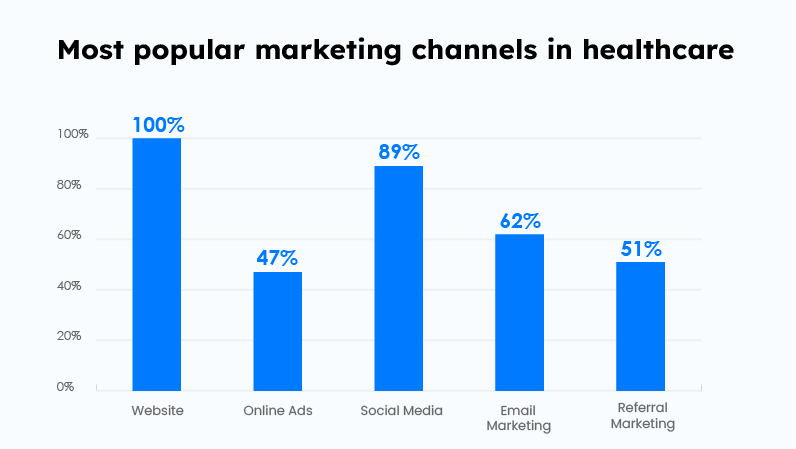
It’s great to see that healthcare organizations are digitally active and patients are able to find them online. Their marketing activities are really paying off!
Although there are several marketing activities possible, we discovered that healthcare firms mainly focus on:
- Referral management (63.64%)
- Lead management (38.64%)
- Online reputation management (34.09%)
- Lead generation (31.82%)
Also, the healthcare marketing teams we surveyed had an average team size of 2-5 members. While the team size may not be a measure of the success of your marketing campaigns, it points to the time and effort your team puts in to bring those patients in.
Fortunately, you can help them achieve better results.
How?
Well, through healthcare CRM.
Let’s check it out.
What is healthcare CRM?
Healthcare CRM is a customer relationship management software specifically designed for the healthcare industry. Any medical institution such as a hospital, laboratory, medical center, a public or private clinic can use healthcare CRM for patient acquisition, management, and retention.
Just like traditional CRM, healthcare providers must keep their patients’ data private.
The difference between a traditional business and healthcare business though is this:
Healthcare providers must be HIPAA compliant.
The prerequisite: HIPAA compliance
The Health Insurance Portability and Accountability Act (HIPAA) sets the standard for patient data protection, which every healthcare institution must follow. Even if it involves using software tools.
For instance, in 2021, there were over 600 reported data breaches, compromising millions of healthcare records.


Such instances break the patient’s trust in the care provider.
That’s why you must take complete responsibility for the patient’s personal information and take every measure to protect it.
An organization can only become HIPAA compliant if the internal systems and third-party tools they use are also HIPAA compliant.
If the provider you choose is HIPAA compliant, be assured, your patient data is safe.
For instance, a HIPAA compliant healthcare CRM adheres to the guidelines provided by HIPAA and ensures privacy and data security of the patient data.
Now, you may be already using an EMR or EHR system for your practice.
But know that it’s not a substitute for a Healthcare CRM.
Here’s the difference between healthcare CRM and EHR systems.
Healthcare CRM vs. EHR
| Healthcare CRM | EHR | |
| Stands for | Customer (Patient) Relationship Management | Electronic Health Record |
| HIPAA compliance | Required.Software like LeadSquared Healthcare CRM are HIPAA compliant. | It is needed. But unfortunately, not all software is HIPAA compliant. Many professionals had to pay fines for HIPAA breaches and violations. |
| Purpose | Patient relationship management, appointment scheduling, hospital workflow automation. | To store a patient’s medical history digitally.It is maintained by the healthcare provider over time and can be shared with authorized providers and staff from more than one organization. |
| Benefits for Hospitals/Clinics | Automated inquiry capture, distribution, personalized communication with patients, appointment scheduling, 360-degree view of patients and easily accessible information. | Faster access to a patient’s medical history and shareability. |
| Benefits for Patients | Consistent and personalized communication from hospitals and clinics. | Patients need not carry their health records when they’re referred to a specialist or they switch provider. |
| Top software solutions | LeadSquared HIPAA compliant healthcare CRM | Epic, EClinicalWorks, DrChrono, NextGen, WebPT |
So, these are the key differences between healthcare CRM and EHR systems.
Note that both software systems serve a specific purpose. For instance, an EHR system can help you improve the quality of care and patient outcomes by enabling access and sharing of medical records across organizations.
On the other hand, a healthcare CRM can help you capture inquiries, engage with patients, and reduce attrition.
However, many healthcare institutions are skeptical about using software tools because:
- The tools they’re aware of are not HIPAA compliant, and
- They haven’t found software that can help with most of their activities.
Let’s take a closer look at the healthcare challenges.
Why do hospitals and clinics need a CRM?
We interviewed several healthcare professionals to understand their day-to-day activities.
Surprisingly, all of them face a similar set of challenges.
Here are the 10 most pressing challenges healthcare professionals face.
- Difficulty in managing inquiries they get from multiple platforms.
- A manual patient intake process.
- Departments working in silos – creating an information gap and communication overhead.
- Manual data entry – creating time and resource overheads.
- The manual process to fetch data for marketing communications.
- No way to track the patient journey across different services being used.
- The manual reporting process for the appointment scheduled. Inability to check whether inquiries move forward in the funnel.
- Integration with payments, EMR, EHR systems
- Non-availability of HIPAA compliant tools
- Inefficient communication and follow-ups – leading to missed appointments and no-shows.
These challenges are obstructing providers from delivering the best patient experiences.
According to a survey conducted by Avtex, 71% of patients want their healthcare services to be as convenient as online shopping.
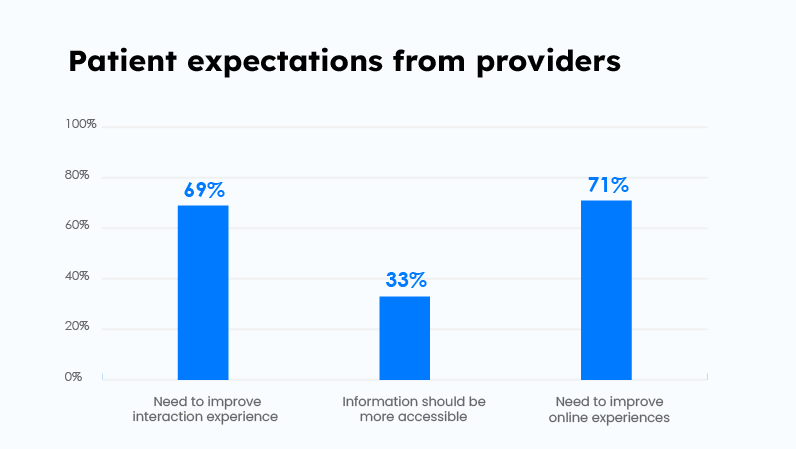
Clearly, there’s a disconnect.
So, how do you deliver a great patient experience while overcoming the above challenges?
Easy. With a healthcare CRM.
Let’s look at its specs in detail.
The benefits of a healthcare CRM
Picture this: A patient has inquired about dental treatment.
Typically, you would schedule an appointment.
Now let’s say you diagnose that the patient needs a root canal treatment. So, you’ll share a follow-up schedule with them.
Now, you can write this down on a post-it note or ask them to make a note.
But either way, both you and the patient have to remember the appointment schedules.
Failing to do so may lead to missed appointments or no-shows.
And no-shows can be costly.
Each no-show increases the chances of patient attrition by almost 70%.
So, “remembering an appointment” is hardly an efficient process is it?
It’s not foolproof, either.
Now, let’s see how the entire appointment management process can be simplified with a healthcare CRM.
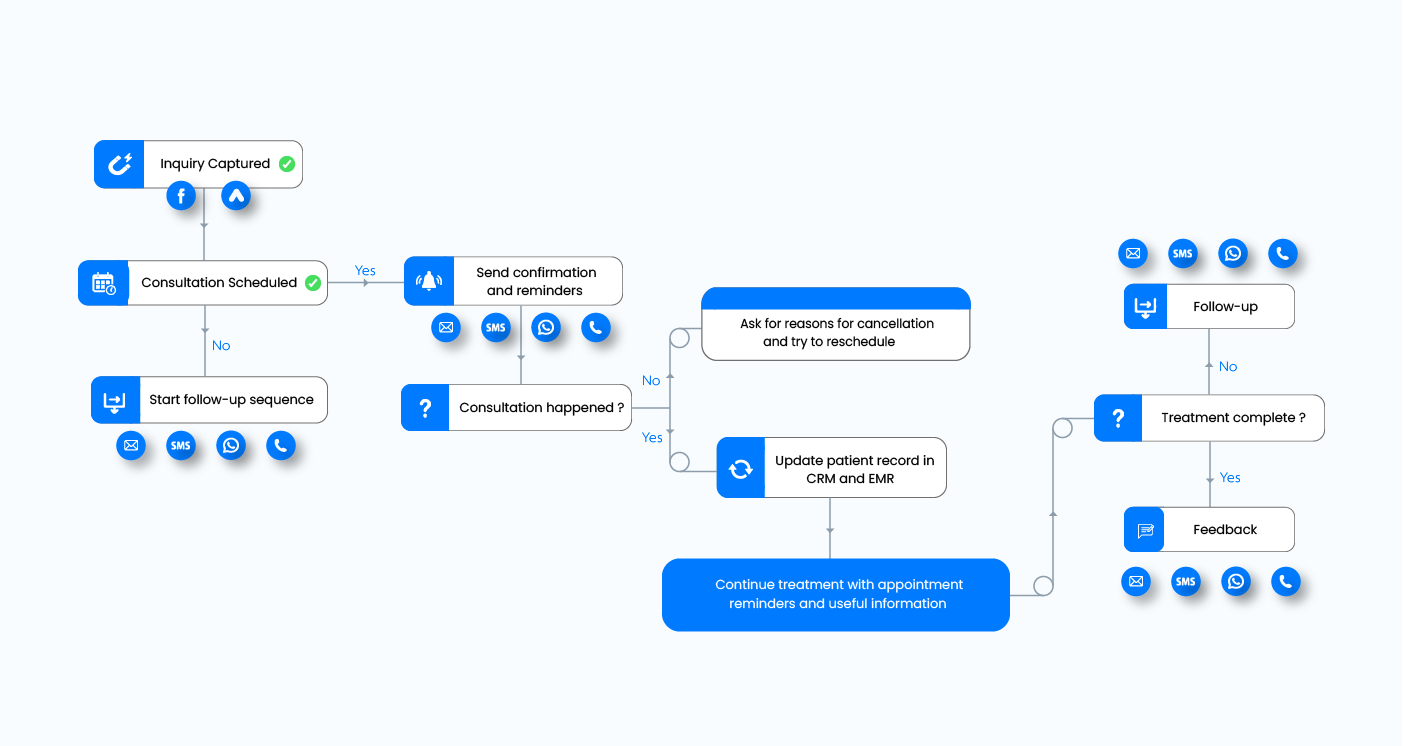
You can send appointment reminder communication, record each interaction and treatment, and ask for feedback – everything from the same platform.
Plus, when you have the patient record with you in your system, you can send them emails and text for routine checkups.
So, this is just a glimpse of Healthcare CRM in action.
Let’s look at some more features of Healthcare CRM that can help you in your day-to-day operations.
- Lead Capture
Automatically capture inquiries from all sources – website, Facebook, Google, lead providers, referrals – onto one platform.
- Lead Management
Easily track and distribute leads between your teams based on patient requirements and other dynamic criteria.
- Patient Portal
To provide faster access to information, self-serve inquiries and appointments.
- Marketing Automation
Patients have different communication preferences.
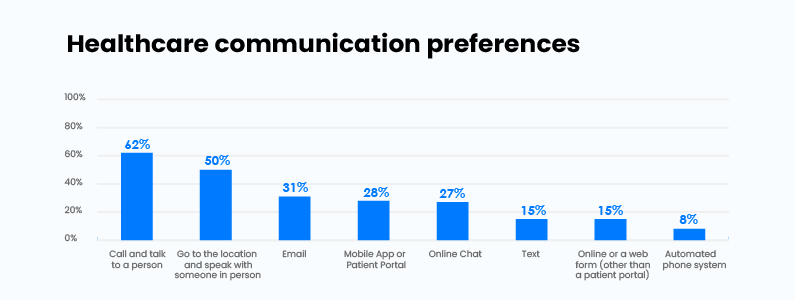
With marketing automation, you can set omnichannel communication to nudge new leads to conversions (SMS, WhatsApp, Email, Phone calls, and more). Run marketing campaigns to strengthen relationships with existing patients.
- Built-in Dialer
Call your patients from the healthcare CRM portal. Track and record conversations your team has with patients to ensure high compliance and productivity.
- Appointment Scheduling
Map patient’s requirements and the doctor’s availability. Book appointments automatically. Send appointment notifications and reminders to both patients and doctors.
- Core Systems Integration
Easily integrate with the EHR systems of your choice for bi-directional information exchange.
- Analytics and Reporting
Automated reports for healthcare sales funnel, coordinator performance, revenue prediction, and more.
So, these are some of the core features of healthcare CRM software.
But remember, the software you choose must be HIPAA compliant. The law applies to all patient data that healthcare providers interact with.
If you’re looking for one such software, here’s our recommendation.
The best HIPAA compliant Healthcare CRM for your organization
LeadSquared healthcare CRM is fully HIPAA-compliant and ensures your practice maintains PHI security. Also, it has been rated the best HIPAA-compliant patient management software by CRM.org.
It helps you:
- Capture patient inquiries from your website, ads, social media, chats, and referral sites.
- Respond to inquiries faster through automated lead distribution.
- Enable omnichannel communication. That is, you can send appointment reminders and other crucial information through email, SMS, WhatsApp, and phone call.
- Automate wait listing and rescheduling and provide links to book self-schedule appointments.
- Automate the patient intake process with hassle-free electronic forms to increase show-up rates.
- Build, customize, and integrate a patient portal into your practice.
- Seamlessly integrate with EMR/EHR system and other tools you rely on to deliver a singular patient view.
- Send requests for reviews via text or email to each patient after their appointment. You can also set it up to push the reviews to popular healthcare review sites, including Google, Yelp, and Healthgrades.
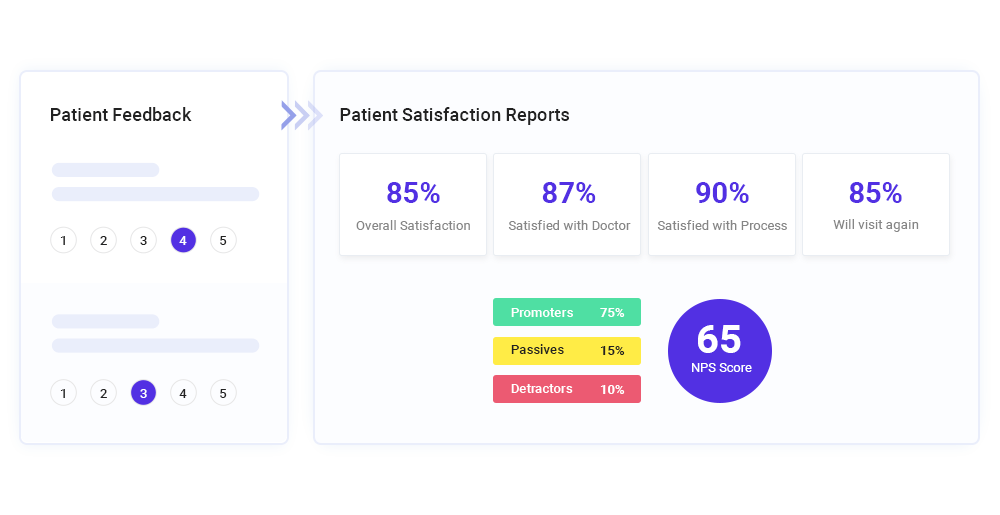
Healthcare professionals agree.
As Siddhartha Nihalani, the VP of Product, Practo, says:
“Implementing LeadSquared has been the best decision we have made. All the automations running within LeadSquared ensure that all our lead management activities, from lead allocation to lead prioritization are handled easily. It’s amazing what we can do now, thanks to LeadSquared. We have already saved 6-8 months’ worth of development cost and effort. Our daily call center efficiency per agent has increased by 60%. The automation has helped us declutter our sales process as well. We are also able to measure everything, much better.”
LeadSquared is one of the best HIPAA-compliant healthcare CRMs trusted by fast-growing and progressive healthcare providers like Form Health, Pulse & Remedy, Klarity, Two Chairs, Advanced Recovery Concepts, Nova Vital Recovery, and more.
Do you want to see how LeadSquared can help you build a more effective and efficient patient relationship?
FAQs
The first and foremost consideration should be – is the CRM HIPAA compliant?
Then look out for its capabilities to integrate with the EMR systems you use – is it seamless, or does it need a lot of coding and technical bandwidth? You can also check if the vendor supports you in the implementation.
Now, you’ll find a lot of similar features in most healthcare CRMs. Check if they fulfill your use cases. For example, LeadSquared healthcare CRM is fully HIPAA-compliant and serves practical use cases.
Healthcare CRM software helps manage patient profiles and data efficiently. For example, medical records, appointment history, treatment history, financial transactions, etc. CRMs also help with workflow automation like appointment reminders, routine check-up reminders, and more.
No, both are different software. EMR stands for Electronic Medical Records. It is a digital record of a patient’s health information, which is sharable across the healthcare ecosystem. In contrast, a CRM is a patient relationship management software that streamlines communication for patient acquisition, management, and retention.









